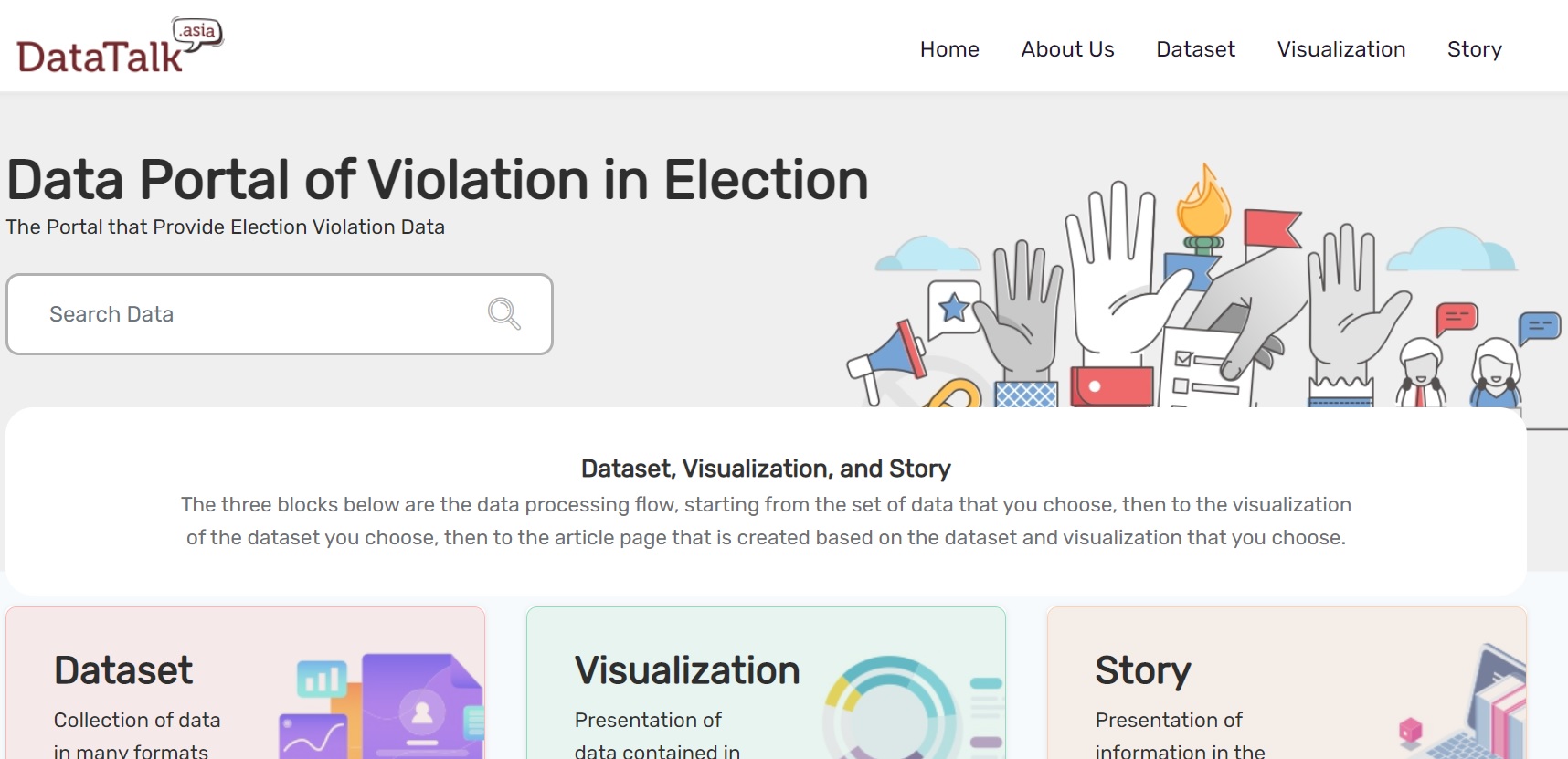Data journalism or data driven journalism is the trend of digital journalism today. In Indonesia itself, various national media have made data an added value from the special coverage or indepth they provide. If Tirto.id excels in data visualization with a cool design and can be accessed free of charge, Kompas provides data driven journalism in a paid version of the digital newspaper. Jaring.id and Katadata.co.id are also very worthy of a visit when the public wants to find out what kind of data can be processed into journalistic products.
There are several brief definitions of data journalism, such as telling stories with data, and journalism that is conducted with data. In full, in the Data Journalism Handbook (2012) published by O’Reilly Media, data journalism is a combination of the ability to “smell the news” with the ability to tell interesting stories with the scale and reach of digital information available. Data journalism can also help journalists tell complex stories through engaging infographics.
In connection with the trends and needs of journalists in the Asia Pacific region for data journalism, Pusat Pengembangan Media Nusantara (PPMN) and Perkumpulan untuk Pemilu dan Demokrasi (Perludem) developed the DataTalk.asia platform. This platform is supported by the USAID-supported Regional Support for Elections and Political Transitions or RESPECT program.
DataTalk.asia was released on Thursday (28/1) virtually. The launch was attended by journalists and democracy activists from various countries, including Myanmar, Malaysia, Indonesia, Nepal, the Philippines, Thailand, Timor Leste and Australia. Also present was a member of the Indonesian General Election Supervisory Board (Bawaslu), Fritz Edward Siregar, who also gave a speech and appreciation for the presence of dataTalk.asia.
In her remarks, RESPECT Chief of Party, Joice Damayanti said that dataTalk.asia, which has been designed since 2019, is intended to support journalists and election and democracy activists in using open data or open election data in csv, xlsx, and json formats. The platform was developed on the basis of a consortium with the Philippine Center for Investigative Journalism (PCIJ), Sinar Project Malaysia, and Jaring.id Indonesia.
“The Consortium of PCIJ, Sinar Project, and Jaring Indonesia provided the dataset for this platform. These organizations also help curate data and look for ways so this data can be shared with journalists. This data portal is intended to help journalists sharpen the messages they want to convey. Hopefully it can increase scientific literacy about elections in Asian society, ” said Joice.
Furthermore, explained by Joice, DataTalk.asia has a main focus on providing a dataset of election violations. The election violations dataset has been equipped with data visualization which is expected to assist journalists in analyzing data.
There are three features that DataTalk.asia users can take advantage of. One, the dataset that can be selected according to the needs. Two, visualizations that can be selected in both visual and graphic form. Three, the story feature which can display the available datasets and visualizations.
“So, it’s easy to use for new members. Just register, create an account, and you will receive a notification via email that you can use the data provided by the platform, “ explained Joice.
PPMN Program Director, Santi said, with the availability of a platform for sharing and processing open data among countries in the Asia Pacific, election journalistic products are getting better quality. It is hoped that institutions engaged in journalism, elections and data disclosure issues can join the DataTalk.asia Consortium.
“The condition faced by journalists regarding data in Southeast Asia is the challenges in freedom of access to information and readiness of information. By using in-depth research, the availability of data related to justice in elections, we can together fight for democracy and a better election,” said Santi at the launch of dataTalk.asia.
The presence of DataTalk.asia was also welcomed by the Executive Director of PCIJ, Carmela Fonbuena. According to her, DataTalk.asia will be useful for journalists’ coverage of the Philippine Presidential Election which will be held in 2022. This platform is also expected to be a forum for mutual learning between journalists in various Asia Pacific countries about how big data or data can be told into journalistic products.
“This portal will help Indonesia and the Philippines, as well as others, on good ways to monitor elections. Perhaps Indonesia can tell how Indonesia encourages open data. So, there will be things we can learn from each other so that we can help each other, ” said Carmela.
In line with Carmela, the Sinar Project Malaysia coordinator, Khairil Yusof, expressed his hope that DataTalk.asia can be developed as a forum to fight political corruption. This is because the data available in each country can not only be used as election data, but also post-election data. DataTalk.asia should be encouraged to initiate issues that are not or rarely discussed by the government in each country.
“We are developing a data application so that journalists can access women’s representation, as well as gender composition in political parties. Why? Because these are not discussed and not announced by the election organizers when they announce the election results. So, we want the data not only for elections, but also to help fight corruption, ”said Khairil.
At the launch event, the Executive Director of Perludem, Khoirunnisa Nur Agustyati, also shared about Perludem’s experience in utilizing election open data in Indonesia. Starting from the Election API in 2014 to the initiation of pintarmemilih.id in the first 2019 Simultaneous Elections in Indonesia.
Open data, said the woman who is familiarly called Ninis, is important for the running of democracy and civic involvement in elections and government. However, the biggest challenge is the awareness and commitment of the election administrators to provide and publish open election data.
“There is no regulation that election administrators must provide open electoral data. Because there is no such task, we rely on the commitment and knowledge of the election organizers to open data. Finally, when the organizers change, we have to go back to teaching again, ” said Ninis.
Indonesia’s challenges are similar to the Philippines. Carmela stated that open data in her country is not something that is available to the public, but is obtained by parties who have personal relationships with election administrators or government officials. Therefore, it is very important to build a culture of data openness.
Various examples of initiating the use of data for journalism
Kuek Ser Kuang Keng, a journalism data consultant at Data N Malaysia, explained various examples of journalism data products that have been initiated by many countries. In fact, big data can indeed be transformed in such a way for democratic purposes, such as guarding an elected government.
In Brazil, www.nabuscadocandidato.com.br/ processes data into a quiz which can be used by voters to judge whether their candidate choice is right or not. The quiz will ask which candidates are supported by the voters, which candidates will be chosen by the voters, then followed by a series of questions related to policies and views brought by the candidates.
“So, this quiz is an easy way to get people to assess whether a candidate who is supported is worthy of being supported or not. So, it’s not just the background, but the policies they carry, ” explained Kuek.
Initiatives for the provision of election information are also taking place in several other countries. There was the Washington Post during the 2020 United States Presidential Election. Then in Spain, the No Bote el Voto website was created to inform candidates’ track records.
Then in Taiwan, https://www.readr.tw/ displays information on the length of time a candidate has sat in parliament. It also contains information on candidates with family members who have been members of parliament. Readr Taiwan also displays campaign finance information and campaign finance games
“So, in this game, you can determine how you spend the campaign funds you have, how much money you spend to win,” said Kuek.
A similar game was developed by MalaysiaKini. Via https://newslab.malaysiakini.com/mp-game/en voters can play the game “Spend Money as People’s Representative”.
Then in the United States, https://electionlandtrends.appspot.com/ElectionDay2020 was built to respond and map incidents that occurred on voting day. By using Google and several other analysis tools, ElectionLand can analyze the wide variety of challenges voters face on polling day. In fact, a hotline number is provided for voters to report events in the field.
“You can use data on what issues people are worried about. For example, they are afraid or going to riot, or there are other administrative problems such as how to avoid long queues, ” said Kuek.
There is also an initiation of The Nation in the United States that checks the fulfillment of elected candidates’ campaign promises. The page will be updated over the next four years.
Another initiative in the United States is the Fivethirtyeights. This page provides electoral data along with the votes acquired by political parties in the last election. With aggregated data, gerry mandering will be seen.
“There are many good initiatives. Likewise with DataTalk.asia. However, I hope that DataTalk.asia does not only provide data, but becomes a forum for journalists to analyze and report on something,” concluded Kuek.
The drive to develop data journalism
In order to encourage the development of data journalism in the Asia Pacific region, PPMN with support from the RESPECT program held another ExcEl Awards. ExcEl Awards are awards for journalists with the best in-depth investigative journalistic work. In 2020, the ExcEl Awards will be held after data journalism training is given to journalists in Indonesia, Malaysia and the Philippines.
“Every two years, PPMN holds the EcxEl Awards. We launched it yesterday in 2019. The ones that can send are journalists who produce breaking news, investigative in-depth news. This could include audio and video as well, ” said Santi.
It is planned that the ExcEl Awards winners for each category will get a prize of USD 1000. In 2021, journalists who will take part in the ExcEl Awards must attend Data Journalism training. []
AMALIA SALABI
 Rumah Pemilu Indonesia Election Portal
Rumah Pemilu Indonesia Election Portal


